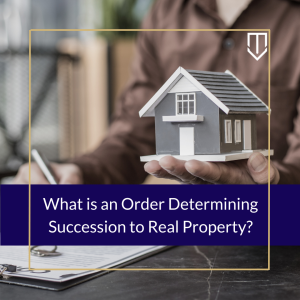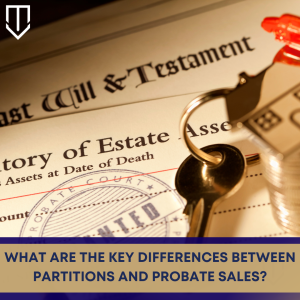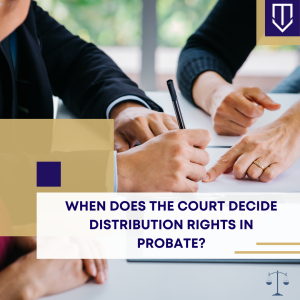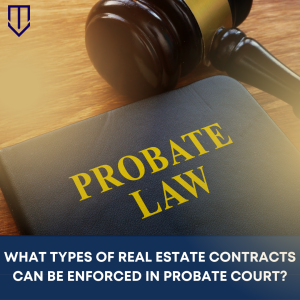 The purpose of this article is to explain the ownership presumption in a probate dispute. This is because property ownership can cause disputes even after death, which must be resolved in the probate or civil courts. (Schlyen v. Schlyen (1954) 43 Cal.2d 361, 370–371.) Specifically, the understanding of how marriage affects ownership presumptions in probate matters was changed in the 2021 case Estate of Wall (Wall). ((2021) 68 Cal.App.5th 168.) This case affects how trial and probate courts will consider ownership disputes. Because this specific case dealt with a probate action, it concerns the property and assets of a decedent. In Wall the court held that the title presumption prevails over the community property presumption.
The purpose of this article is to explain the ownership presumption in a probate dispute. This is because property ownership can cause disputes even after death, which must be resolved in the probate or civil courts. (Schlyen v. Schlyen (1954) 43 Cal.2d 361, 370–371.) Specifically, the understanding of how marriage affects ownership presumptions in probate matters was changed in the 2021 case Estate of Wall (Wall). ((2021) 68 Cal.App.5th 168.) This case affects how trial and probate courts will consider ownership disputes. Because this specific case dealt with a probate action, it concerns the property and assets of a decedent. In Wall the court held that the title presumption prevails over the community property presumption.
What is an Ownership Presumption?
Marriage and death can both affect the presumption of who owns a disputed piece of property. There are two main presumptions which affect these disputes. First, the title presumption is that the property title being in a person’s name means that person will prevail in an ownership dispute. (Pearce v. Briggs (2021) 68 Cal.App.5th 466, 483.) The title presumption is derived from the evidence code. (Evid. Code, § 662 .) Second, the community property presumption is that the property being purchased with community funds of a married couple means the property belongs to the community (both parties) in a property dispute. (In re Brace (2020) 9 Cal.5th 903, 938.) The community property presumption is based on the family law code. (Fam. Code, § 760.) If a court rules the title presumption will prevail that means the person with their name on the title will prevail even if the property was bought during their marriage with community funds.
 California Partition Law Blog
California Partition Law Blog


 Probate proceedings can often be complex, especially when it comes to the sale of property within an estate. In California, the rules governing commissions for agents, brokers, and auctioneers involved in probate sales are outlined in California Probate Code.
Probate proceedings can often be complex, especially when it comes to the sale of property within an estate. In California, the rules governing commissions for agents, brokers, and auctioneers involved in probate sales are outlined in California Probate Code. An order determining succession to real property is an alternative petition to get a court order transferring the property. (Prob. Code § 13154.) If the estate is small enough, and a successor to the decedent has proof that they are entitled to a certain piece of property, then they may use this process to become a title owner.
An order determining succession to real property is an alternative petition to get a court order transferring the property. (Prob. Code § 13154.) If the estate is small enough, and a successor to the decedent has proof that they are entitled to a certain piece of property, then they may use this process to become a title owner. Partitions sales and probate sales are two different ways that a property can be sold. A main difference between the two is that a partition sale is ordered and overseen by the court, while a probate sale is generally overseen by a personal representative, and the court can have minimal involvement. There are also specific steps that the personal representative must take in the probate sale process under California law.
Partitions sales and probate sales are two different ways that a property can be sold. A main difference between the two is that a partition sale is ordered and overseen by the court, while a probate sale is generally overseen by a personal representative, and the court can have minimal involvement. There are also specific steps that the personal representative must take in the probate sale process under California law.  When a person passes away and leaves behind the property, their property must first pass through the probate process before being passed down to family members and loved ones. Essentially, the probate process is a legal process that determines the execution of the estate of someone who has passed away. Moreover, during the probate process, the court appoints an executor or an administrator to administer the deceased’s estate. Therefore, probate property refers to any assets or property left behind by a deceased person that passes through the probate process.
When a person passes away and leaves behind the property, their property must first pass through the probate process before being passed down to family members and loved ones. Essentially, the probate process is a legal process that determines the execution of the estate of someone who has passed away. Moreover, during the probate process, the court appoints an executor or an administrator to administer the deceased’s estate. Therefore, probate property refers to any assets or property left behind by a deceased person that passes through the probate process.  For family members of a deceased loved one, the most important part of probate proceedings is the final distribution of the estate. This occurs once the estate’s debts and obligations have been satisfied, and it serves to more or less end the probate of the estate.
For family members of a deceased loved one, the most important part of probate proceedings is the final distribution of the estate. This occurs once the estate’s debts and obligations have been satisfied, and it serves to more or less end the probate of the estate.  Real estate contracts are an expansive field of both law and life.
Real estate contracts are an expansive field of both law and life.